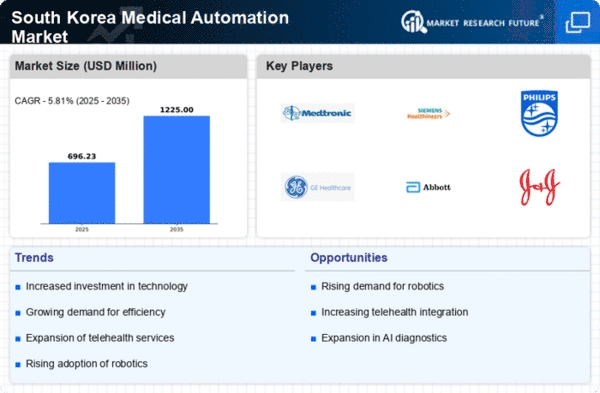Government Initiatives and Funding
In South Korea, government initiatives aimed at advancing healthcare technology are significantly influencing the medical automation market. The government has allocated substantial funding to support research and development in automation technologies. This includes grants and subsidies for healthcare facilities that implement automated systems. Recent reports indicate that public investment in health tech is expected to reach over $500 million by 2026, fostering innovation and adoption of automation solutions. Such initiatives not only stimulate market growth but also encourage collaboration between public and private sectors, leading to the development of cutting-edge technologies that enhance healthcare delivery. The proactive stance of the government serves as a catalyst for the medical automation market.
Growing Focus on Patient-Centric Care
The shift towards patient-centric care is reshaping the landscape of the medical automation market in South Korea. Healthcare providers are increasingly prioritizing patient engagement and satisfaction, leading to the adoption of automation solutions that enhance the patient experience. Technologies such as automated appointment scheduling, telehealth platforms, and personalized treatment plans are gaining traction. This focus on patient-centricity is supported by data indicating that patient satisfaction scores are closely linked to the use of automated systems. As healthcare organizations strive to improve their service delivery, the integration of automation into patient care processes is likely to become more pronounced, driving growth in the medical automation market.
Rising Demand for Efficiency in Healthcare
The medical automation market in South Korea is experiencing a notable surge in demand for efficiency within healthcare systems. As healthcare providers strive to enhance operational workflows, automation technologies are increasingly being adopted. This trend is driven by the need to reduce human error and improve patient outcomes. According to recent data, the market is projected to grow at a CAGR of approximately 12% over the next five years. This growth is indicative of a broader shift towards streamlined processes, where automation plays a crucial role in managing patient data, scheduling, and treatment protocols. The emphasis on efficiency not only benefits healthcare providers but also enhances the overall patient experience, making it a pivotal driver in the medical automation market.
Technological Advancements in Medical Devices
Technological advancements in medical devices are propelling the medical automation market forward in South Korea. Innovations such as smart diagnostic tools, automated laboratory equipment, and robotic surgical systems are becoming increasingly prevalent. These advancements not only enhance the precision and efficiency of medical procedures but also reduce the time required for diagnosis and treatment. The market for automated medical devices is projected to grow by approximately 15% annually, reflecting the rapid pace of technological integration in healthcare. As healthcare providers seek to adopt the latest technologies to improve patient care, the demand for automated solutions continues to rise, making it a significant driver in the medical automation market.
Aging Population and Increased Healthcare Needs
The demographic shift towards an aging population in South Korea is a critical driver of the medical automation market. As the elderly population grows, there is an escalating demand for healthcare services, which places immense pressure on existing healthcare systems. Automation technologies are being recognized as essential tools to manage this increased demand effectively. It is estimated that by 2030, over 20% of the population will be aged 65 and older, necessitating innovative solutions to ensure quality care. Automation can assist in monitoring chronic conditions, managing medication, and facilitating remote consultations, thereby alleviating some of the burdens on healthcare providers. This demographic trend underscores the importance of automation in meeting the evolving healthcare needs of the population.
















